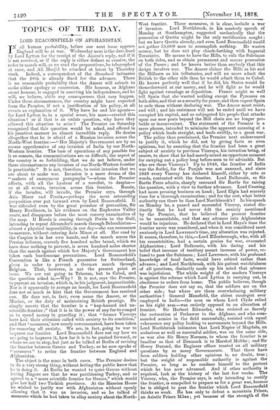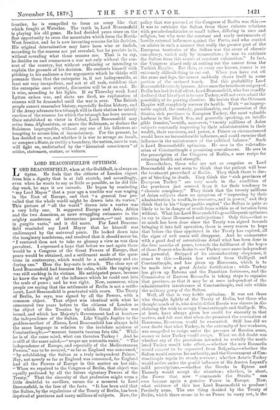TOPICS OF THE DAY.
LORD BEACONSFIELD ON AFGHANISTAN.
Iall human probability, before our next issue appears 1 England will be at war. Wednesday next is the date fixed by Lord Lytton for the receipt of the Ameer's reply, and if it is not received, or if the reply is either defiant or evasive, the order to march will, as we read the preparations, be telegraphed at once, and Ali Musjid be attacked at latest by Thursday week. Indeed, a correspondent of the Standard intimates that the 28th is already fixed for the advance. There is no reasonable probability that the Ameer will submit to make either apology or concession. His honour, as Afghans count honour, is engaged in asserting his independence, and he will, we believe, abide any consequences that may happen. Under these circumstances, the country might have expected from the Premier, if not a justification of his policy, at all events an explanation of it. Why have he and his agents— for Lord Lytton is, in a special sense, his man—created this situation ? or if that is an unfair question, why have they allowed this situation to arise ? The Premier on Saturday recognised that this question would be asked, and offered in his jauntiest manner an almost incredible reply. He denies altogether that he is afraid of a Russian invasion across the North-West frontier:—" Her Majesty's Government are by no means apprehensive of any invasion of India by our North- Western frontier. The base of operations of any possible foe is so remote, the communications are so difficult, the aspect of the country is so forbidding, that we do not believe, under these circumstances any invasion of our North-Western frontier is practicable." It is not, therefore, to resist invasion that we are about to make war. Invasion is a mere dream of the " makers of anonymous paragraphs "—whom the Premier affects, with all the hauteur of a novelist, to despise— or at all events, invasion across this frontier. Russia, if she invades, will invade, the Premier says, through Asia Minor and Persia,—perhaps the most astounding proposition ever put forward even by Lord Beaconsfield. It was ridiculed even by the great preacher of precaution, Sir Henry Rawlinson, in his evidence on the Euphrates Valley route, and disappears before the most cursory examination of the map. If Russia is coming through Persia to the Gulf, intending to repeat Alexander's march through Beloochistan- almost a physical impossibility, in our day—she can commence to-morrow, without entering Asia Minor at all. Her road by the Caspian is in her own hands, and the march across the Persian isthmus, scarcely five hundred miles broad, which we have done nothing to prevent, is seven hundred miles shorter than the march against which her Majesty's Government has taken such burdensome precautions. Lord Beaconsfield's Convention is like a French guarantee for Switzerland, given in order to prevent a German march through Belgium. That, however, is not the present point at issue. We are not going to Teheran, but to Cabul, and the question asked is,—Why ? It is not, says the Premier, to prevent an invasion, which is, in his judgment., impracticable. Nor is it apparently to avenge an insult, for Lord Beaconsfield does not so much as hint that the Government has received one. He does not, in fact, even name the Ameer, or the Mission, or the duty of maintaining British prestige. He simply asserts that the frontier is a " hap-hazard and un- scientific frontier ;" that it is in the power of any foe to compel us to spend money in guarding it ; that former Viceroys have had their attention called with anxiety to its condition," and that ' measures,' now nearly consummated, have been taken for removing all anxiety. We are, in fact, going to war to improve our frontier. Lord Beaconsfield does not say how we are going to improve it, how far it is to be pushed forward, or where we are to stop, but just as he talked at Berlin of revising the frontier between Greece and Turkey, so he now speaks of " measures " to revise the frontier between England and Afghanistan.
The object is the same in both cases. The Premier desires to do a very strong thing, without letting the public know that he is doing it. At Berlin he wanted to quiet Greece without letting Jingoes see that he was partitioning Turkey, and so agreed to a " more scientific frontier for Greece," which would give her half two Turkish provinces. At the Mansion House he wished to justify war with Afghanistan without openly allowing that it was an invasion, and so he talked of measures which he had taken to allay anxiety about the North- West frontier. Those measures, it is clear, include a war of invasion. Lord Northbrook, in his masterly speech of Monday at Southampton, suggested sardonically that the possession of Quetta might be the only rectification sought but we have Quetta already, and even Lord Beaconsfield would not gather 35,000 men to accomplish nothing. He wastes money, but he does not play chuck-farthing with Imperial Treasuries. He means to have the Hills, to rule the Suleiman on both sides, and so obtain permanent and secure possession of the Passes ; and he knows better than anybody that this design involves war. The Ameer claims the Hills as his and the Hillmen as his tributaries, and will no more admit the British to the other side than he would admit them to Cabul. He knows perfectly well that if he did, his States would lie thenceforward at our mercy, and he will fight as he would fight against vassalage or deposition. France might as well tell Spain that she wanted nothing except the Pyrenees on both sides, and that as a security for peace, and then expect Spain to cede them without declaring war. The Ameer must resist, and will ; and his resistance will not be ended until we have occupied his capital, and so subjugated his people that attacks upon our new posts beyond the Hill chain are no longer pro- bable or inconvenient. The statement of the Premier is a mere phrase, intended to minimise the apparent meaning of a policy which leads straight, and leads swiftly, to a great war.
The policy thus proclaimed, the Premier next endeavoured to justify it, which he did, not by giving facts or even opinions, but by asserting that the frontier had been a great subject of anxiety to previous Viceroys, his intention being, of course, to show that he had merely seized an opportune moment for carrying out a policy long before seen to be advisable. But who are these Viceroys ? Up to 1848, the frontier of India was the Sutlej, for the Punjab was not annexed, and since 1848 every Viceroy has declared himself, either by acts or words, contented with the frontier. Lord Dalhousie, as Sir Bartle Frere admits, sharply censured Sir Bartle for raising the question, with a view to further advances. Lord Canning had more pressing business on hand ; Lord Elgin had scarcely time for a thorough examination ; and for the rest, what better authority can there be than Lord Northbrook's ? In his speech on Monday he, a passed and successful Viceroy, stated dis- tinctly that he had never felt the anxiety mentioned by the Premier, that he believed the present frontier to be unassailable, and that any advance into Afghanistan would be injurious. He declared that in Lord Mayo's time the frontier never was considered, and when it was considered most anxiously in Lord Lawrence's time, any alteration was rejected. It comes, therefore, to this,—Lord Ellenborough, who, with all his eccentricities, had a certain genius for war, evacuated Afghanistan ; Lord Dalhousie, with his daring and his belief that increase of territory meant increase of power, re- fused to pass the Suleiman ; Lord Lawrence, with his profound knowledge of local facts, would have retired rather than advance ; and Lord Northbrook, with his patient watchfulness of all questions, distinctly made up his mind that advance was injudicious. The whole weight of the modern Viceroys is against the scheme which Lord Lytton is carrying out, in obedience to orders from home. The public believes, though the Premier does not say so, that the soldiers are on the other side ; but where are these overwhelming military authorities ? General Mansfield, the ablest strategist ever employed in India—the man on whom Lord Clyde relied as his right arm—was entirely opposed to an alteration of frontier. Sir Herbert Edwardes, who resisted so fiercely the restoration of Peshawur to the Afghans, and who com- manded armies in the field successfully, resisted with equal vehemence any policy looking to movements beyond the Hills. Lord Northbrook intimates that Lord Napier of Magdala, an audacious as well as successful soldier, was on the same side, as was also Sir Henry Norman, to whom the frontier is as familiar as that of Denmark is to Marshal Moltke ; and Sir Henry Durand, the Engineer officer trusted on all military questions by so many Governments. That there have been soldiers holding other opinions is, no doubt, true ; but the weight of responsible authority is against the Premier, so long as he confines himself to the pretext which he has now advanced. And if other authority is required, look at the history of the last few weeks. The Viceroy, who, the Premier says, is only intending to rectify the frontier, is compelled to prepare as for a great war, because he is obliged to pass the frontier which Lord Beaconsfield thinks so weak. He has only to defeat a mountain Prince, an Asiatic Prince Milan ; yet because of the strength of the



































 Previous page
Previous page